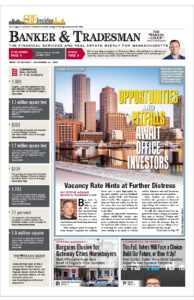
Malia Lazu
As we look across the real estate and financial services landscape, we are so far from declaring victory in closing the wealth gap and improving access to capital for Black and Brown people wanting to start or grow their businesses, buy a home or invest in themselves such as with higher education. But there are some hopeful signs of change.
During this season of thankfulness, let’s examine three trailblazers from 2023. Together, they show what’s possible to increase access to capital for underrepresented consumers and entrepreneurs – not out of some sense of charity, but because it’s good for business and our community.
Eastern Bank’s Equity Alliance for Business
The launch of Eastern Bank’s Equity Alliance for Business early in 2023 was an important step forward in greater economic inclusion and mobility. The Alliance seeks to support the growth and prosperity of businesses whose ownership is 51 percent or more women or people of color and across all intersectionality, including the LGBTQIA+, veteran and disabled communities, who may not qualify for access to capital with traditional underwriting standards.
The Alliance strives to establish an ecosystem that includes bankers who serve as consultative relationship managers to business owners and, equally important, who are grounded in the communities in which underserved businesses operate. It’s also working to create specialized credit products and other solutions designed for diverse business owners, and other products and solutions, including a mobile-friendly “financial assistant” for small business owners. It’s also opening access to insights, network-building and community collaborations.
Banks and other lending institutions take heed: Eastern’s launch of the Alliance recognizes the growth potential that exists within underrepresented and underbanked communities. At a time when serving the majority will not produce significant growth, Eastern is looking to expand its footprint with services and products that Black and Brown business owners need to thrive. The more these minority-owned business enterprises grow, the better it is for the local economy. This will be evident in many areas, from demand for commercial real estate and increased homeownership to more jobs created by small businesses, which are the engine of most economic growth.
State Street’s Civil Rights Audit
Corporate America in general and financial institutions in particular often declare their commitment to diversity and inclusion, as we saw with the many statements and a total of $50 billion in commitments from major companies in the wake of George Floyd’s murder in May 2020. But how many companies truly hold up a mirror to look at themselves and their commitments with candor and transparency?
State Street is one of the largest financial institutions in the world with a fiduciary business that makes it “too big to fail.” Earlier this year, State Street released the results of its Civil Rights Audit, which was designed to be an objective assessment of its policies, practices, products and services, with input from clients and potential clients, as well as critics.
The audit produced a transparent accounting of current practices. It shows where State Street is leading the pack and where it must improve – all of which becomes a roadmap for guiding the institution forward. As the report states: “Understanding State Street’s motivations and goals, and where within the company there may be differing views, was necessary to identify the scope of changes that are needed.”
Competitors take note. State Street is not just stating a commitment to equity and inclusion. It is embracing a level of transparency rarely seen in business. If Boston’s real estate development and financial communities want to know what it will take to build this kind of reputation, read the State Street Civil Rights Report, available publicly.
An Economy That Loves Black People
“While Black people have disproportionate access to wealth, we do not have any fewer excellent business ideas, which means that this gap in capital results in good businesses being unable to secure funds to get their ideas off the ground.”
With those words, Jessica Norwood frames the reality faced by Black entrepreneurs in her new book “Believe-in-You Money: What Would It Look Like If the Economy Loved Black People?” Not only is Jessica’s book compelling in its urgency, but it also lays out an innovative solution to increase Black companies’ access to capital.
Jessica’s book draws from her work as a co-founder of Runway, a pioneer in providing capital and other solutions to underserved and underrepresented businesses and consumers. Runway opens greater access to “friends and family”-style capital for Black entrepreneurs as it pursues its mission to improve the equity-centered practices of financial institutions and others that seek to serve Black entrepreneurs and Black-led organizations.
Investors pay attention: Jessica’s proven model shows how to put your money where your values lie – and make a return. Financial institutions that get onboard with this concept will also position themselves for future growth, while building a reputation for being truly invested in the empowerment of Black and Brown entrepreneurs, consumers and communities.
As 2023 comes to a close and we look ahead to a new year, how can we expand this gratitude list? The more we do to expand the economic pie, the more there will be for everyone – equitably and inclusively.
Malia Lazu is a lecturer in the Technological Innovation, Entrepreneurship and Strategic Management Group at the MIT Sloan School of Management, CEO of The Lazu Group and former Eastern Massachusetts regional president and chief experience and culture officer at Berkshire Bank.





